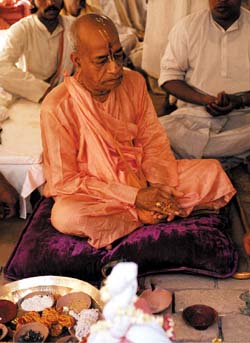Who Is a Member of ISKCON? #6 – What ISKCON Membership Is Not
By Kripamoya Das | Jul 28, 2012

The lineage of gurus in our sampradaya. Does initiation make us members of ISKCON?
I wrote that periodically, in the interests of unity and preserving its essential characteristics, ISKCON has to identify those who can no longer be considered members. But with an open-door policy, and no universally applied membership criteria – except for the voluntary self-identity of those who wish to regard themselves as members, or be regarded as such – it is impossible for the organization to state categorically exactly when someone becomes a member.
This has led some existing members – perhaps slightly more exclusive than inclusive members – to consider that the point of initiation is the time when factual membership begins, and that therefore initiated members are the sole members. In the absence of any other distinct point when religious membership commences it is easy to see how this conception developed. By extension, the initiation ceremony then becomes a ritual of acceptance into full ISKCON membership and people even talk of being ‘initiated into ISKCON.’
Naturally this raises certain conceptual difficulties. First, if only initiated members are actual members, then what of others? The ISKCON movement is comprised of anything up to one million individuals, only a fraction of them initiated. Are the others then not members? Should another, comparable organization be created for them?
Second, initiation is the act of receiving mantras, making vows, and accepting a guru. Simultaneous with this is membership of the sampradaya. When you become initiated you automatically become a member of a particular sampradaya. In the case of ISKCON the sampradaya is Brahma-Madhva-Gaudiya, to use the rather cumbersome, but precise, name. Becoming a member of the sampradaya, however, is not simultaneous with becoming a member of ISKCON. The two are distinct and different. One is the membership of a lineage of spiritual preceptors stretching back into distant history; the other, membership of an organization that was incorporated in 1966.
There are, perhaps, more than 30 million members of the Brahma-Madhva-Gaudiya sampradaya living today, mostly in India. And dozens of organizations that represent that spiritual lineage. ISKCON is the most important organization since it represents the sampradaya internationally in 100+ languages and does so effectively. So if you can join the sampradaya but not be in ISKCON; and be in ISKCON but not be formally in the sampradaya, it stands to reason that you cannot be ‘initiated into ISKCON.’ That would make an organization a sampradaya, which it isn’t. I have even heard the expression: ‘I’ve been initiated by ISKCON,’ which makes the organization a guru – which it isn’t.
Similarly, and using the same logic, nobody can really be ‘an ISKCON guru.’ The term is widely used, and we all think we know what it means, but it causes widespread confusion, no matter how convenient a term it may be. One may regard someone as one’s guru, and that guru-figure may be in ISKCON, but that really doesn’t make him an ‘ISKCON guru,’ any more than one can be an ‘ISKCON husband’ or ‘ISKCON father.’ Guru, husband and father are all descriptions of a role an individual takes in a relationship with someone else. Guru is a role, not an organizational post. For others, your guru is not a guru, merely a good practitioner or a good teacher. No organization can make someone a guru, just as an organization cannot make someone a husband. Only an individual can do that by choice. Fuzzy language leads to fuzzy conceptions.
But I digress. The real point today is that ISKCON membership does have a beginning, and that requires to be more clearly understood, articulated, and promoted. And it also, sadly, has an end for some.















